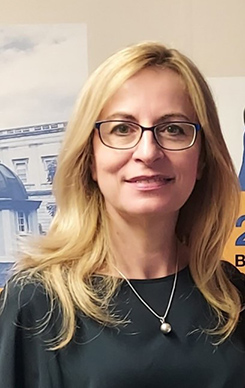
Cosette is an Associate Professor in Mathematics Education at UCL Institute of Education in London, where she is leading the internationally renowned MA in Mathematics Education programme. She started her professional journey as a mathematician, and her passion for the discipline found resonance in her teaching of mathematics at all levels of education. Cosette is involved in a wide range of activities supporting mathematics education in schools, colleges and universities, with particular interests in researching the nature of subject-specific knowledge within the school curriculum and teacher education, and in promoting and researching the use of digital technology in mathematics education.
1. What’s your earliest memory of doing mathematics?
I have a vivid memory of the day my parents bought a wooden pencil case for my older sister when she joined primary school. The pencil case had an abacus attached to the inside of the lid. The miniature abacus had beads of two different colours and arranging them in various patterns kept me busy for long periods of time, to my parents’ surprise and my sister’s understandable slight annoyance. Pattern making soon became counting, and I remember inventing all sorts of number rules for splitting the beads into patterns, which I then patiently and repeatedly explained to my favourite toys when I was four years old.
2. How has mathematics education changed in the time you have been involved in it?
I did all my mathematics until the age of 21 mostly with pen and paper, or chalk on the blackboard. I then moved to Scotland, where I had my first encounter with a computer algebra system (Maple), newly purchased by the mathematics department at The University of Edinburgh. I found it fascinating and troubling that the computer algebra system was ‘able’ to do most of the algebra and calculus I knew. Reflecting on that first experience with the new technology, I wrote a short article which was published in the ‘Mathematics Teaching’ journal in 1999. More than 20 years on, with access to a plethora of digital tools and applications that are capable of performing numerical calculations and algorithmic processes, and are able to quickly produce accurate graphs, I find it concerning that these tools are still not fully integrated into the maths education of our children – future citizens of the digitally infused 21st century. As a mathematics teacher educator, I hope (and I will do my best to ensure that) this will change in the next 20 years, if not sooner.
3. Tell me about a time in your career when something totally flabbergasted you.
I began to fall in love with mathematics through studying Euclidean geometry throughout my secondary and high school education (11–18 years old). I had fun when doing geometry, while learning to be intuitive and creative when working with diagrams, learning about proofs, and being fascinated about how geometric facts and ideas came together to find a solution. So, I was truly flabbergasted when, after moving to England and starting teaching, I realised that little of the geometry I studied was part of the schemes of work in the schools I worked in. I believe that there is hope for a revival of an interest in and an appreciation of geometry, in accessible and exciting ways enabled by the use of digital technology with its potential to develop students’ geometrical intuition and reasoning.
4. Do you practise mathematics differently in company?
I always need ‘a bit’ of time for myself to think about the maths question posed. Only then will I happily collaborate, cooperate, listen to others and engage with their ideas, but not until I have had my ‘private moment’ with the maths question, to understand it my way. I am almost reluctant for someone else to spoil for me the fun of getting a glimpse into a potential solution. I am selfish in that way 😏.
5. Do you think a brilliant maths teacher is born or made?
Made, definitely, and in continuous making, shaped by a love for the subject, an increasing confidence in the subject, as well as an enjoyment in communicating maths. A brilliant maths teacher is also a teacher who never stops learning, who is continuously tapping into the great maths education resources, tools and ideas, and who is also prepared to learn ‘new maths’ to remind themselves what it is like to wonder, to get stuck, to be frustrated and then elated by solving it.
6. What’s the most fun a mathematician can have?
In my experience, mathematicians have fun when doing maths with others, collaborating and learning from others, and challenging each other for a better approach or a more elegant solution. Writing solutions and scribbling on each other’s notes on random bits of paper found in their proximity or on shared online whiteboards, only to be discarded at the end of the conversation, which often leads to new ideas and solutions.
7. Do you have a favourite maths joke?
“I wish I were sine squared and you were cosine squared so that together we could be one!”. Not quite a joke, but it certainly brought a smile to my face when one of my A level students proudly announced to the whole class that he knew a mathsy chat up line, which he hoped might come in handy one day … I hope it did!
Join the conversation: You can tweet us @CambridgeMaths or comment below.